- Home
- Terry C. Johnston
Lay the Mountains Low Page 9
Lay the Mountains Low Read online
Page 9
Fort Lapwai
June 29, 1877
My Dear Mamma,
I would give the world and all to see you, but I guess we will have to wait until the Doctor takes us in. I hope and pray the time will pass quickly until our time here is over, and that we will all be spared to meet again.
This horrible Indian war hangs over me like a gun. I can’t shake it off and am daily expecting the Doctor will be ordered to join the troops in the field. We are all very anxious here. The dispatches that came in last night told us the troops were in sight of the Indian stronghold. I shall hope and pray that I shan’t have to come home to you, after all, without my dear husband. Poor Mrs. Theller is still waiting here. She won’t leave until she can get her husband’s body. This losing one’s husband in this way seems too horrible to think about. I can’t help feeling how awfully hard it would be to lose my dear John any way, but that way would be hardest of all.
Your loving daughter,
Emily F.
*Devil’s Backbone, vol. 5, the Plainsmen series.
CHAPTER EIGHT
JUNE 27-JULY 1, 1877
BY TELEGRAPH
—
Daring Postoffice Robbery at Manhattan, Kansas.
—
IDAHO.
—
The Indian Situation—Telegram from Gen. Howard.
SAN FRANCISCO, June 29.—A Portland press dispatch says Colonel Wood has just received the following dispatch from General Howard, dated at the front, June 27, 8:45 A.M.: We have overtaken Joseph, who is well posted at the mouth of White Bird creek. Chief White Bird has been in charge of the entire united bands of Joseph and is the fighting chief. The Indians are bold and waiting for us to engage them. Lieutenant Trumbull and volunteers are at Slate creek. Our headquarters tonight will be at the mouth of White Bird creek. The rains are very troublesome; roads and trails bad; troops in best of spirits and ready for decisive work.
AFTER SPENDING THEIR SECOND DAY ON THE WHITE BIRD battlefield, General Oliver O. Howard ordered his column on down White Bird Creek to its mouth, where they turned left and marched south, up the Salmon River, approximately two miles before finding enough open ground to bivouac the command. Late that afternoon as the first pickets were being established on his perimeter, A, D, G, and M batteries of the Fourth Artillery and C Company of the Twenty-first Infantry rumbled in to join the command.
“In memory of the slain officer, this will be recorded as Camp Theller,” Otis told his united officer corps that evening after supper as the rain continued to pour down upon his column. “It’s from here that we will begin our chase of the fleeing hostiles.”
While the constant rain continued to batter the oiled canvas awning lashed over their heads, Howard went on to explain that, come morning, he was dispatching Captain David Perry back to Fort Lapwai for more ammunition and rations.
“This has more and more the appearance of a long campaign,” he said regretfully, “longer than I would have anticipated on the day we departed Lapwai. But, with the additional reinforcements, we now have more than five hundred and thirty men, which include some sixty-five volunteers. In fact, ‘Captain’ William Hunter and his band of volunteers just arrived from Dayton, in Washington Territory. Accompanying them down from Lapwai, I’m most pleased to welcome Lieutenant Wood to my staff. Lieutenant, please take a step forward so all the men can get a look at you.”
The slight, good-looking Wood eased into the center of that half-circle of cavalry and infantry officers. Nodding several times to the others, he then stepped over to stand near the commanding general.
“Mr. Wood will serve as my aide-de-camp for the remainder of the campaign.”
SECOND Lieutenant Charles Erskine Scott Wood found it very difficult to sleep that night. Not that it was too cold or too damp for his tastes. Just that he constantly reminded himself to sleep light for fear of a surprise attack from the Nez Perce rumored to be right across the river from Camp Theller.
He finally gave up and crawled out of his bedroll after midnight. From the sounds of his snoring, General Howard was sleeping soundly in his tent nearby, so Wood lit a small candle and unbuckled the straps on his haversack. Reaching inside, he pulled out the spanking new leather-bound ledger book he had recently purchased in Lewiston on his way to the front. Positioning it across his thighs, Charles pulled a long pencil from the breast pocket he had had sewn inside his field blouse, then made the first entry on that very first page of his field diary.
Overtook the main column, gentlemanly officers looking like herders, rough aspect of everyone, business not holiday costumes—
Camp—singing, story telling and swearing, profanity—carelessness, accepting things—horrible at other times—as a matter of course. … Again there is the necessary leaving of last messages for sweet hearts, mothers, and wives, telling of jokes about being killed, about not looking for “my body” &c firing expected tomorrow. …
Rain—eternal rain—veal & no veal—supper in camp. Visiting the different messes, youngsters with neither bedding nor shelter, rough it jokingly—night duty, posting the pickets—rough times all night standing in the rain—no fire—no talking, no bedding—no sleeping.
When next he tried to sleep, Wood had eventually drifted off, nonetheless kept restless at first by the distant howl of coyotes in the nearby hills. Most of the officers and most of the soldiers had long ago learned that just such a howl had been heard by many of Perry’s men as they sat in the dark, waiting out the coming of dawn and their disastrous attack. To most every man in Howard’s command, those calls from the hills in the dark on that rainy night could come from only Nez Perce scouts keeping an eye on the camp … perhaps even signaling everything in readiness for their attack.
Finally able to sleep deeply, the young lieutenant was abruptly awakened by a gunshot just past midnight. That single report was followed by lots of loud noises from men angry and frightened at being caught off-guard in the middle of the night with what they thought was a wholesale attack by Nez Perce warriors.
As it turned out, in the melee and confusion, the camp was not under assault. Instead, a picket returning to his company had been mistaken for an enemy by a groggy, half-sleepy lieutenant jostled into that frightening reaction. The wounded soldier lingered in great pain until morning. Just past daybreak, he was buried nearby before the command prepared to move upriver.
Lieutenant Wood found another moment to scratch at his diary beside his breakfast fire.
The alarm sounded at midnight—one of our own pickets shot by one of our men.* Up at 2 o’clock for fear of Indian habits of attack—roll call at 6.
That Thursday morning, the twenty-eighth of June, Howard moved his column up the Salmon to Horseshoe Bend, where his troops began preparations to cross the river, following the trail of the fleeing Non-Treaty bands. Wood and others studied the swift, deep current and secretly wondered if the general would get his command across without incident utilizing the cable ferry Howard planned to employ after sending a pair of Nez Perce scouts across the river, dragging the ropes behind them.
But before they could even send the friendlies into the river, more than eighty-five warriors appeared on the hills across the Salmon, racing their horses down to the west bank, shouting, screaming, and firing their rifles. In another explosion of pandemonium, the soldiers dived this way and that for their weapons, precipitating another long-distance shooting match. Within minutes the noisy skirmish was over and the enemy horsemen were on their way, turning downriver to disappear beyond a nearby slope, with no apparent casualties on either side.
“The general has decided it was only a ruse, a diversion,” Wood reported to the companies spread out along the east bank of the Salmon. “They only want to keep us from crossing, to give their village more time to disappear into the heights on the other side. We must keep working as quickly as possible to get the command across!”
As hard as the men worked against the confines of those steep canyon walls, agai
nst the boiling current of the Salmon now in its full strength with spring runoff, it was not until the next morning, 29 June, when the column began its crossing.
But it would take them the whole of three long summer days to force their way across the mighty Salmon before they could even think about slogging into the wild and rugged hills on the other side.
HE was not your young, excitable sort. Not this Stephen Gerard Whipple. Forty years old, repeatedly described as “reliable” in reports written by his superiors, this captain had been the officer selected to march two companies of cavalry into the Wallowa valley earlier in the spring while Joseph and Ollokot were attending a peace parley with General O. O. Howard at Fort Lapwai. It was from his cantonment located at the western approaches to the Wallowa country that he had brought in his battalion, along with “Captain” Tom Page and his twenty-one volunteers from the town of Walla Walla.
Of moderate height and strongly built, Whipple had a presence about him, stemming mostly from his darkbrowed, steely gaze. Born in upstate Vermont, the captain had been living on the West Coast when the Civil War erupted. He had served out the war with the California infantry, where he rose to the rank of lieutenant colonel, saw extensive duty on the frontier, and held a brevet for “faithful and meritorious service.” About a year and a half after Appomattox, Whipple received a commission as captain in the Thirty-second Infantry, but in December of 1870 he requested, and was awarded, a transfer to the First U. S. Cavalry.
Whipple was again the man Howard would now choose for another lonely, dangerous, and ultimately fateful mission.
“I want you to take two companies of cavalry and arrest Looking Glass,” the general stated not long after sunset the night before.
“A-arrest him, General?”
For a moment, Howard ground his teeth as if in exasperation at searching for an explanation, then declared, “For some weeks it has appeared that Looking Glass and his band of Alpowai were going to be peaceful. But now intelligence has been brought to me from our friendlies, reports showing that the chief and his headmen are leaning toward joining the hostiles.”
Whipple wagged his head. “But … don’t we have a reliable report that Looking Glass left the other bands after the murders began?”
“Yes,” and Howard nodded, watching the light fade behind the tall mountains on the other side of the Salmon. “We were told he and his band wanted nothing of the war Joseph, White Bird, and the rest were starting.”
“So—with all due respect, General—why am I to arrest Looking Glass now?”
The general’s eyes narrowed; he was clearly not a man comfortable with having his decisions questioned. “Because some of the friendlies say he and his people are turning toward the hostiles. I’ve just received news that Looking Glass may have supplied at least twenty warriors to those who butchered Perry’s command on the White Bird. There’s a credible report that he’s become a turncoat now, intending to join the hostiles himself at the first favorable opportunity.”*
More reports from four Mount Idaho citizens reached Howard that there was substantial evidence to show that warriors from Looking Glass’s band had sacked two other homesteads: one belonging to Idaho County Commissioner George Dempster, and the other to James T. Silverwood. In addition, warriors had driven off stock. When the four whites attempted to approach the Looking Glass camp on Clear Creek, they were motioned to stay away in a hostile manner. In the minds of most white citizens, the Alpowai were clearly up to no good.
Even Inspector Erwin C. Watkins of the Indian Bureau wrote Howard that Looking Glass was “running a recruiting station for Joseph.”
As history turns out, Howard’s “friendlies” were actually two Mount Idaho civilians, Ezra Baird and Robert Nugent, who rode to Lewiston to excite the populace and local newspaperman with their tales that the Looking Glass people had declared war on the whites, intending to start hostilities in a few days!
Whipple gestured across the river at the west bank of the Salmon. “So we can’t afford to have him and his warriors join up with the rest who are running loose over there in the Clearwater country.”
It was evening on the twenty-ninth, the first day of those three it would take Howard to get his column across the turbulent current.
“Exactly, Captain. Looking Glass’s people live and tend their gardens, graze their cattle, and breed their horses on their traditional grounds somewhere along the Clearwater.”
“Yes, sir—I know the place.”
“Technically, the Alpowai reside inside the reservation boundaries … but they’ve never signed any of the treaties.”
“Are some of the Christian bands nervous about the sympathies of the Looking Glass people, now that hostilities have broken out?”
“That’s a mild way of putting it, Captain,” Howard declared. “I’ve decided to arrest the chief and contain his people long enough to turn them over to the Mount Idaho volunteers.”
“You really want to put them in the care of the citizens, General?” Whipple challenged. “Isn’t that like turning over a canary to the care of the house cat?”
Howard appeared to bristle at this unvarnished questioning of moral sensibility of his planned arrest. “It will only be for a short time, Captain Whipple,” he grumbled assuredly. “They will be in the care of the volunteers only until I can bring in the rest of these Non-Treaty troublemakers.”
“You figure to catch up to them and drive them back across in this direction, General?”
“With you having the Looking Glass band under control on the east, and I herding Joseph from the west—we’ll have them all onto the reservation within a week’s time.”
“As your order, sir. I’ll draw four days’ rations and sufficient ammunition for my march tonight, then depart in the morning.”
“I would prefer that you leave before dawn, Captain.”
Whipple nodded, sensing even more the importance of this mission. “We don’t want to give Looking Glass or his henchmen any more time for making trouble.”
“You might remember that I’m sending Colonel Perry back to Lapwai in the morning. He’ll be covering part of the same trail up to Camas Prairie, where you’ll turn off.”
“To bring up more reinforcements from his post, General?”
“No,” Howard answered. “He’s taking the pack train with him to pick up more supplies and ammunition … on the outside chance that this campaign to drive the hostiles back across the Salmon takes longer than a week. In the final analysis, Looking Glass’s band inhabits the country near my supply lines. So no matter what way you look at it, Captain—I must take care of him before I subdue the others.”
Whipple’s cavalry battalion moved out beneath a leaden sky before first light on the morning of 30 June, marching back down the Salmon to the mouth of the White Bird, then groping their way along the creek, moving east to the divide and over to Mount Idaho, where, during a short stop that afternoon that allowed the men time to eat and rest their horses, twenty civilians under “Captain” D. B. “Darius” Randall enthusiastically volunteered their services in helping to arrest Looking Glass. It was as plain as the brass on his buttons that these volunteers were itching to get a little revenge on the Nez Perce who had murdered so many friends of theirs. But Whipple was certain he could control them, and if the unthinkable happened … all the better to have more rifles along. One of the older volunteers, J. A. Miller, offered his services as an interpreter.
With the addition of these civilians, the captain felt nothing but confidence that he and his officers could handle what might be thrown their way. Accompanying Whipple’s L Company was Captain Henry E. Winters in command of E Company. Serving with Winters were First Lieutenant Albert G. Forse—an 1865 graduate of the U. S. Military Academy, who had spent the last ten years serving with the First Cavalry in the Northwest—and Second Lieutenant William H. Winter, who graduated in 1872 and was promptly thrown into the Modoc War in southern Oregon.
In order to be on Looking G
lass’s doorstep at dawn on the first of July, Whipple ordered his detail men back into the saddle as the sun began to set that thirtieth day of June. Leaving behind their two .45-caliber Gatling guns and a detail of four men to operate those weapons in Mount Idaho so they could travel all the faster without the encumbrance of those prairie carriages, the eighty-seven men set off north, their objective some twenty-five miles away. Angling across the extreme southeastern corner of the Camas Prairie as the light faded, they struck the South Fork of the Clearwater, fully intending to make quick, efficient work of their warrant from Howard to prevent more of Looking Glass’s warriors from joining up with those hostiles to whom Howard was preparing to give chase.
No matter the black of that moonless night, despite the ruggedness of the hills as they picked their way down one grade, then up a long, difficult slope to reach the high ground that rose abruptly along the east side of the Clearwater, Captain Steven Whipple pushed on, fully intending to catch the sleeping village unawares and completely unprepared at the peep of day.
*Most Indian Wars historians now agree that the lieutenant who was startled in his sleep and shot the returning picket was, in fact, Charles E. S. Wood himself.
*Howard and history do not clearly indicate how he reached these conclusions about Looking Glass’s band, with the exception of the rampant rumors being circulated by Lewiston Teller editor Alonzo Leland, who repeatedly alleged in those days following the White Bird debacle: “Indian runners and Chinamen say the Looking Glass band has been increased in numbers, that they have plundered Jerome’s place at the Clearwater bridge, that their whole movements indicate hostile intention though they pretend to yet be friends to the whites.”

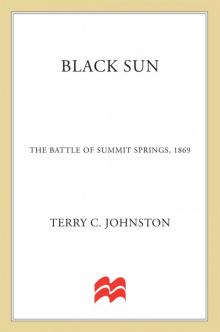 Black Sun, The Battle of Summit Springs, 1869
Black Sun, The Battle of Summit Springs, 1869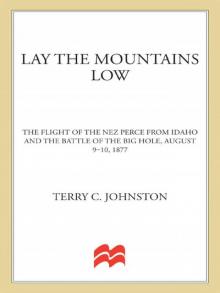 Lay the Mountains Low
Lay the Mountains Low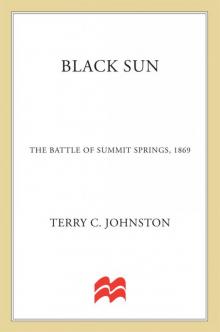 Black Sun: The Battle of Summit Springs, 1869 (The Plainsmen Series)
Black Sun: The Battle of Summit Springs, 1869 (The Plainsmen Series)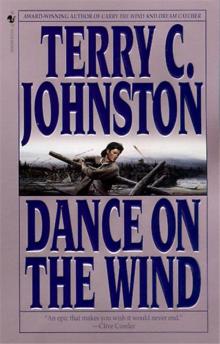 Dance on the Wind tb-1
Dance on the Wind tb-1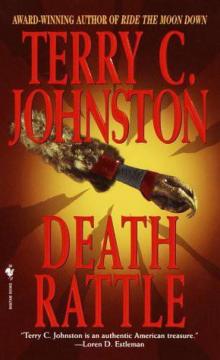 Death Rattle tb-8
Death Rattle tb-8 The Stalkers
The Stalkers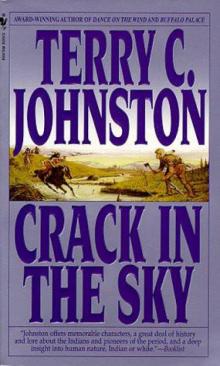 Crack in the Sky tb-3
Crack in the Sky tb-3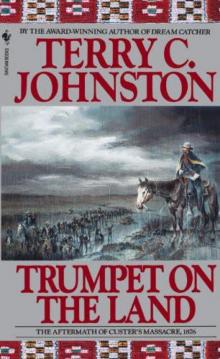 Trumpet on the Land: The Aftermath of Custer's Massacre, 1876 tp-10
Trumpet on the Land: The Aftermath of Custer's Massacre, 1876 tp-10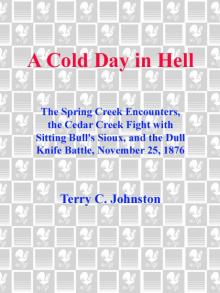 A Cold Day in Hell
A Cold Day in Hell Long Winter Gone: Son of the Plains - Volume 1
Long Winter Gone: Son of the Plains - Volume 1 Buffalo Palace
Buffalo Palace Cries from the Earth
Cries from the Earth Death Rattle
Death Rattle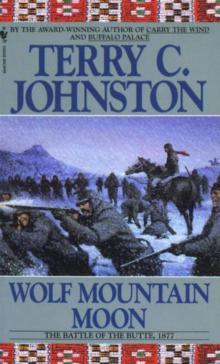 Wolf Mountain Moon: The Battle of the Butte, 1877 tp-12
Wolf Mountain Moon: The Battle of the Butte, 1877 tp-12 Crack in the Sky
Crack in the Sky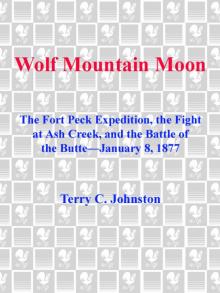 Wolf Mountain Moon
Wolf Mountain Moon Turn the Stars Upside Down: The Last Days and Tragic Death of Crazy Horse
Turn the Stars Upside Down: The Last Days and Tragic Death of Crazy Horse Winter Rain
Winter Rain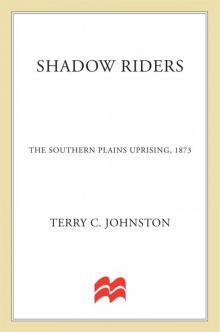 Shadow Riders: The Southern Plains Uprising, 1873 (The Plainsmen Series)
Shadow Riders: The Southern Plains Uprising, 1873 (The Plainsmen Series)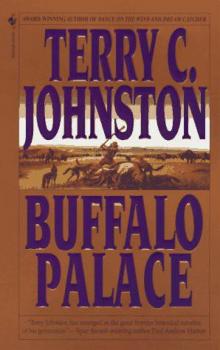 Buffalo Palace tb-2
Buffalo Palace tb-2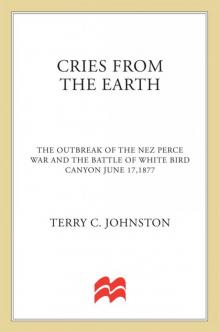 Cries from the Earth: The Outbreak Of the Nez Perce War and the Battle of White Bird Canyon June 17, 1877 (The Plainsmen Series)
Cries from the Earth: The Outbreak Of the Nez Perce War and the Battle of White Bird Canyon June 17, 1877 (The Plainsmen Series)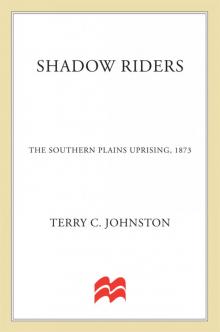 Shadow Riders, The Southern Plains Uprising, 1873
Shadow Riders, The Southern Plains Uprising, 1873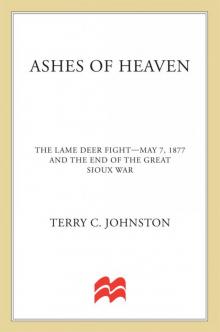 Ashes of Heaven (The Plainsmen Series)
Ashes of Heaven (The Plainsmen Series)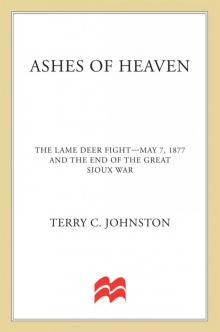 Ashes of Heaven
Ashes of Heaven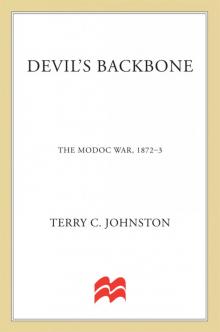 Devil's Backbone: The Modoc War, 1872-3
Devil's Backbone: The Modoc War, 1872-3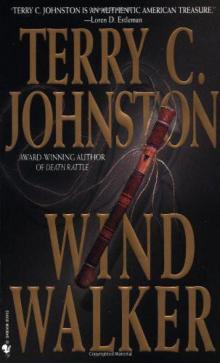 Wind Walker tb-9
Wind Walker tb-9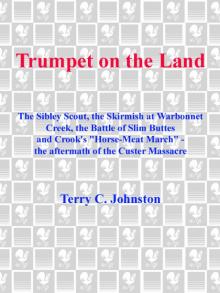 Trumpet on the Land
Trumpet on the Land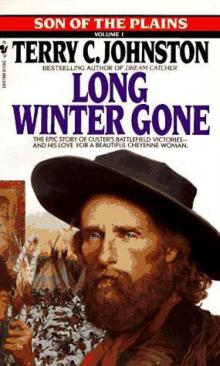 Long Winter Gone sotp-1
Long Winter Gone sotp-1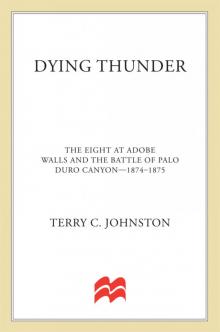 Dying Thunder
Dying Thunder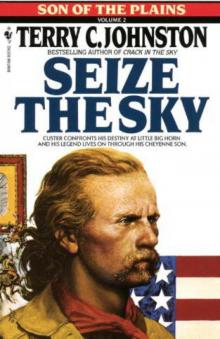 Seize the Sky sotp-2
Seize the Sky sotp-2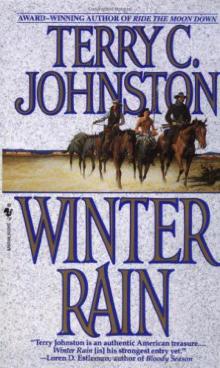 Winter Rain jh-2
Winter Rain jh-2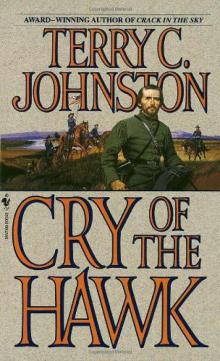 Cry of the Hawk jh-1
Cry of the Hawk jh-1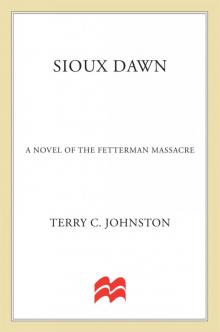 Sioux Dawn, The Fetterman Massacre, 1866
Sioux Dawn, The Fetterman Massacre, 1866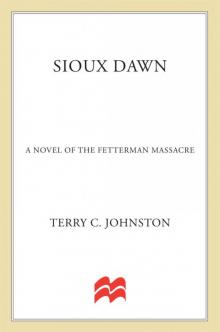 Sioux Dawn: The Fetterman Massacre, 1866 (The Plainsmen Series)
Sioux Dawn: The Fetterman Massacre, 1866 (The Plainsmen Series) Ride the Moon Down
Ride the Moon Down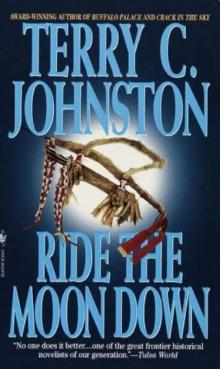 Ride the Moon Down tb-7
Ride the Moon Down tb-7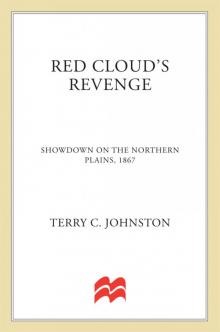 Red Cloud's Revenge
Red Cloud's Revenge Wind Walker
Wind Walker